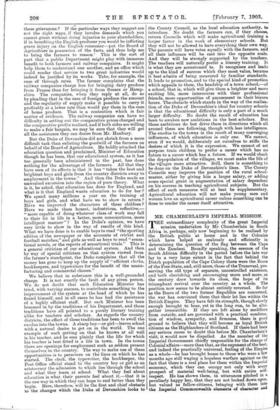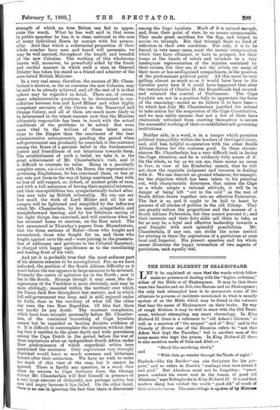MR. CHAMBERLAIN'S IMPERIAL MISSION.
rrIHE extraordinary complexity of the great Imperial _L mission undertaken by Mr. Chamberlain in South Africa is, perhaps, only now beginning to be realised by the British public at home and. in the Colonies which have helped so zealously and efficiently in determining the question of the flag between the Cape and the Zambesi. Broadly speaking, the essence of the South African difficulty in the period before the late war lay to a very large extent in the fact that behind the Dutch population of the Cape Colony there were the Boers of the Free State, and, still more, those of the Transvaal, pre- serving the old type of separate, uncontrolled existence, and both cherishing and encouraging more and more, as the century drew towards its close, the hope of its triumphant revival over the country as a whole. The position now seems to be almost entirely reversed. So far as the Boers of the two former Republics are concerned, the war has convinced them that their lot lies within the British Empire. They have felt its strength, though slowly enough brought to bear, yet in the long run, to be alto- gether irresistible. If they are left alone by meddlers from outside, and are governed with a practical combina- tion of wisdom, sympathy, and firmness, there is good ground to believe that they will become as loyal British citizens as the Highlanders of Scotland. If there had been any serious cause to doubt this before Mr. Chamberlain's visit, it would now be dispelled. As the member of the Imperial Government chiefly responsible for the charge of Colonial affairs—more than that, as the exponent of the best, and indeed the practically universal, feelmg of the Empire as a whole—he has brought home to those who were a few months ago still waging a hopeless warfare against us the fact that there is a real place for them within the Imperial economy, which they can occupy not only with every prospect of material well-being, but with entire self- respect. He has shown them, in utterances pitched in a peculiarly happy key, that they are not looked down upon, but valued as fellow-citizens, bringing with them into the Imperial Commonwealth elements of character and strength of which no true Briton can fail to appre- ciate the worth. What he has well said in that sense in public speeches he has, it is clear, enforced in the case of many individual Boers by contact with his person- ality. And. that which a substantial proportion of their whole number have seen and heard will permeate, we may be well assured, throughout the length and breadth of the new Colonies. The working of this wholesome leaven will, moreover, be powerfully aided by the frank and cordial manner in which such a man as General Delarey has taken his stand as a friend and admirer of the once-hated British Minister.
In a very real sense, therefore, the success of Mr. Cham- berlain's mission, so far as concerns the new Colonies, may be said to be already achieved, and all the rest of it in that sphere may be regarded as detail. There are, of course, many administrative questions to be determined in con- sultation between him and Lord Milner and other highly competent servants of the Crown in the Transvaal and Orange Colony, and all of them are much more likely to be determined in the wisest manner now that the Minister ultimately responsible has been in touch with the actual conditions of the problems to be solved. But even more vital to the welfare of these latest acces- sions to the Empire than the enactment of the best administrative arrangements, pending the period when self-government can prudently be conceded, is the existence among the Boers of a genuine belief in the fundamental justice and friendliness of our intentions towards them. The establishment of such a belief, we take it, is the great achievement of Mr. Chamberlain's visit, and it is difficult to overrate its value. Being in a peculiarly complete sense, vis-a-vis with the Boers, the representative governing Englishman, het has convinced them, or has at any rate put them in the way of being convinced, that with no loss of self-respect, or, indeed, of ancient pride of race, and with a full assurance of having their material interests, and their susceptibilities too, sympathetically looked after, they may take up British citizenship. No one can say how much the work of Lord Milner and all his as- sistants will be lightened and simplified by the influence which Mr. Chamberlain, by his manly, sympathetic, and straightforward bearing, and by his felicitous saying of the right things, has exercised, and will continue when he has returned home to exercise, on the Boer mind. The fact announced in Thursday's papers from Bloemfontein, that the three sections of Boers—those who fought and surrendered, those who fought for us, and those who fought against us to the end—were joining in the presenta- tion of addresses and petitions to the Colonial Secretary, is charged with happy significance as to the conciliating and healing fruit of his visit.
And yet it is probably true that the most arduous part of his mission remains to be accomplished. For, as we have indicated, the position of the South African difficulty as it stood before the war appears in large measure to be reversed. Formerly the centre of agitation lay in the North ; now it lies in the South. Strange though it may seem, the dis- appearance of the Vierkleur is more obviously, and may be more abidingly, resented within the territory over which the Union Jack flew throughout last century, and in which full self-government was long, and is still, enjoyed under its folds, than in the territory of what till the other day were the two Boer Republics. Of this fact there can hardly be any doubt. The constant complaints, which have been brought personally before Mr. Chamber- lain, of the continued boycotting of Cape loyalists cannot but be regarded as bearing decisive evidence of it. It is difficult to contemplate the situation without feel- ing that it testifies to the great depth and wide prevalence among the Cape Dutch in the period before the war of those aspirations after an independent South Africa under Boer predominance of which superficial critics here questioned the existence. Only aspirations very strongly cherished would leave so much soreness and bitterness behind after their extinction. We have no wish to make too much of this view of the case, but it cannot be ignored. There is hardly any question, in a word, that when he returns to Cape territory from the Orange Colony. Mr. Chamberlain will find himself in presence of S very large amount of disloyalty, not perhaps active, but sore and angry because it has failed. On the other hand, thElre is no use in ignoring the fact that there is discontent among the Cape loyalists. Much of it is natural enough, and, from their point of view, by no means unreasonable. They made great sacrifices for the flag' and helped to secure its triumph. But that triumph finds no kind, of reflection in their own condition. Not only, it is to be feared, in very many oases, must the money compensation which they have obtained, or have in prospect, for their losses at the hands ' of rebels and invaders be a very inadequate representation of the injuries sustained by their estates, but they see, if not the rebels, yet many of their more or less undisguised sympathisers, in the position of the predominant political party. All this must be very galling, almost as much so as it would have been to the Cavalier party here if it could have happened that after the restoration of Charles II. the Roundheads had secured and retained the control of Parliament. The Cape loyalists are not in a position fully to appreciate the force of the reasoning—sound as we believe it to have been— by which last July Mr. Chamberlain justified his refusal to take action for the suspension of the Cape Constitution, and we may safely assume that not a few of them have obstinately refrained from exerting themselves to secure the successful working of their re-established self-governing institutions.
Neither side, in a word, is in a temper which promises political tranquillity within the borders of the Cape Colony, and, still lees, helpful co-operation with the other South African States for the common good. In these circum- stances Mr. Chamberlain has a very difficult task in facing the Cape situation, and he is evidently fully aware of it. On the whole, so far as we can see, there seems no cause to fear, in view of his Kimberley speech, that he will not show the requisite judgment and resource in dealing with it. We can discover no ground whatever, for example, for the objection which has been taken to his pointing out, with characteristic directness, that unless the Cape as a whole adopts a rational attitude, it will be in danger of being left "out in the cold" as the rest of South Africa draws together into an effective Federation. The fact is so, and it ought to be laid to heart by persons of all shades of politics in the old Colony. They can greatly reduce the proportions and the success of a South African Federation, but they cannot prevent it ; and their interests and their duty alike call them to take, as far as may be, a loyal and effective leadership towards a goal fraught with such splendid possibilities. Mr. Chamberlain, if any one, can strike the notes needed for stirring in them the aspirations of a patriotism at once local and Imperial. His present speeches and his whole career illustrate the happy interaction of two aspects of patriotism, each equally real.











































 Previous page
Previous page